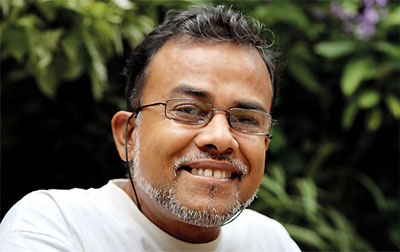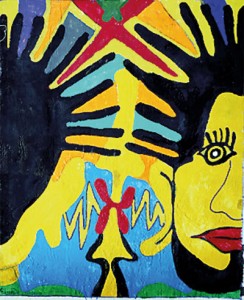Helping others break free
View(s):Diagnosed as being mentally ill two decades ago, this is the story of Sujeewa Senanayake, who not only overcame his condition following treatment, but also gives a helping hand to others in a similar situation. Kumudini Hettiarchchi reports
He has been there and knows what it is like. This is why he volunteers to help others to get back on their feet and go back to their homes.
Sujeewa Senanayake’s life is like a canvas with both the bright and vibrant colours and the greys and blacks of despair.
Having experienced it all, a wonderful childhood but a youth marred by mental illness, he is well-equipped to do the good work he is doing at the National Institute of Mental Health (NIMH) at Angoda.

Sujeewa: Taking one day at a time. Pic by M.A. Pushpa Kumara
“Three days a week I am at the Occupational Therapy Unit of the NIMH, earlier derogatorily known as the Pissan Kotuwa,” says 49-year-old Sujeewa, explaining that he helps the patients with art work and to write resumes. He also plays board games with them and enjoys sessions of music every Friday, playing the drums.
On World Mental Health Day celebrated in October, Sujeewa turned his passion for art to put on sale T-shirts with hand-painted animals with dolphins abounding which he sold to raise funds for the worthy cause of tackling mental illness.
Growing up as the youngest of five siblings, there had been no signs of what awaited him as a youth. Life went on like for any other child, Thurstan Junior School and Mahanama College in Colombo and finally Trinity College in Kandy, not only poring over his books but also engaging in many sports activities such as swimming, cricket and gymnastics.
However, disillusionment about the unfairness of life struck him as a schoolboy when he saw a poor but good cricketer being chucked out of the team to make way for the son of an influential person at Mahanama. “I was a left-hand spinner but left the team on a matter of principle,” says Sujeewa. His principles may have cost him cricketing glory but as he looks back there are no regrets.
At Trinity College later he was more into cadeting and oriental music, he recalls, proudly re-living the time when he won the special Rev. Fraser Memorial Prize for Natural History in 1982.
Disappointment awaited him when he crashed his Advanced Level, but life seems to have got on course again when he joined the March for Conservation organisation headed by Prof. Sarath Kotagama, volunteering for research work on small mammals in Sinharaja, which fuelled his love of animals.
The documentary ‘Whales weep not’ filmed off Trincomalee propelled him towards NARA (National Aquatic Resources Research & Development Agency) and its National Marine Mammal Programme. “I had to go out to sea to collect data and photographs on by-catches of dolphins entangled in gillnets which were being speared by fishermen and also record dolphin sounds,” says Sujeewa who was working under the guidance of world-famous cetologists Dr. Stephen Leatherwood and Dr. Roger Payne from the United States of America (USA).
NARA work was followed by a stint at Air Lanka as a Cargo Assistant after which it was to the US he headed to attend college, having got a very high score at TOEFL. In New Jersey, Sujeewa secured a job at a gas station, with an assurance that his employer would also take care of 75% of his fees in college at Kean University where he first studied bioscience and later biotechnology.
His troubles began when he had a disagreement with his employer and left his job, finding temporary work here and there to continue his studies and survive.
His personal life was also in turmoil, as he had just ended a long-distance relationship with his girl friend, unable to pay the high phone bills on which it thrived.
“It was in 1994 that I was told that I was mentally-ill,” says Sujeewa, going into detail about the downward slide thereafter – getting counselled, slipping down on his tight academic schedules as he was working three jobs to keep financially stable, getting arrested, being taken to hospital and also spending time in jail. Family and friends were on tenterhooks, always supportive of him and never abandoning him, although there is much stigma attached to mental illness.
“I was not my usual self,” he says, although earlier he had been on the Dean’s List and was atop of his strenuous study-work regimen.
He was “working too much”, says Sujeewa, with the memories flowing forth about holding down three jobs at a laboratory, a kennel and a department store, sometimes parking his car by the roadside, spending the night in it, as he had no place to call home.
Fondly he speaks of the dogs he groomed at the kennel — Webber’s Training School at Princeton, where apparently physicist Albert Einstein in his time had brought his dog.
“I was promoted as a groomer after a short while cleaning the kennels and feeding and exercising the dogs,” says Sujeewa, who was in charge of about 25 “big ones” which included St. Bernard dogs, Pyrenees Mountain Dogs, Golden Retrievers, Labradors, Afghan Hounds and also smaller fellows such as Collies, Pomeranians and even Chihuahuas.
Mental illness was dogging his life, being diagnosed as psychotic first, schizophrenic later and finally as having bi-polar disorder. “I was never violent, only erratic and eccentric,” he says, all of which started when he was under a lot of stress.
Sujeewa’s meanderings not only from one city in the US to another but also from one job to another continued, for he had by now dropped out of college. He also haunted shelters for the homeless where he would get a warm meal, clothing and a place to rest his weary body for the night.
His “podi, podi jobs” varied from working for a Mexican family in their home, cooking and cleaning and also at their shop; at a pier where there were horse carriages; as a labourer; washing dishes at a Sri Lankan restaurant; and nearly being part of a fishing vessel.
“The day before I was to join a fishing boat, parts of Pirith Poth came to my mind. I heard a voice urging me not to fish,” says Sujeewa, which deterred him from fishing.
There were arrests too as well as people who came to his aid and long stays in Buddhist temples for homeless Sujeewa who finally came back to Sri Lanka in 2000 at the urgings of his family, with similar brushes with the law, jobs as a security guard and treatment indigenous-style while being confined to a cage following, until he ended up at Mulleriyawa’s open ward in 2006 under Consultant Psychiatrist Dr. Neil Fernando.
A string of short stints at Basic Needs, Ruk Rekaganno and once again at NARA always ended in “disagreements”.
However, with the final diagnosis as suffering from bi-polar disorder, Sujeewa is being effectively treated at the NIMH and is now on medication that allows him to function on even keel, without hospitalisation and within the community.
It is at the persuasion of Dr. Fernando and with permission from NIMH Director Dr. Jayan Mendis that Sujeewa is now helping those facing a similar plight to re-integrate into society.
Reiterating that he has been advised to relax a lot and not get stressed, he says that when one is mentally-ill everything is like a zero. This is why Sujeewa takes one day at a time.
| Painting with empathy No words are necessary. Sujeewa’s colourful paintings are testimony to the empathy he has for the mentally-ill. “We must not look down on those who are mentally ill,” he reiterates as he shows us his abstract painting on schizophrenia titled ‘Whisper’ to indicate the voices that such patients hear. Meanwhile, his love of animals is amply portrayed by the paintings of dolphins on T-shirts. Sujeewa’s hope is that one day he would be able to hold his very own exhibition.
|



